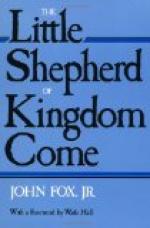“Surrender,” was the message. “Go back to your homes, I will not have one of these young men encounter one more hazard for my sake.”
That night Richard Hunt fought out his fight with himself, pacing to and fro under the stars. He had struggled faithfully for what he believed, still believed, and would, perhaps, always believe, was right. He had fought for the broadest ideal of liberty as he understood it, for citizen, State and nation. The appeal had gone to the sword and the verdict was against him. He would accept it. He would go home, take the oath of allegiance, resume the law, and, as an American citizen, do his duty. He had no sense of humiliation, he had no apology to make and would never have—he had done his duty. He felt no bitterness, and had no fault to find with his foes, who were brave and had done their duty as they had seen it; for he granted them the right to see a different duty from what he had decided was his. And that was all.
Renfrew the Silent was waiting at the smouldering fire. He neither looked up nor made any comment when General Hunt spoke his determination. His own face grew more sullen and he reached his hand into his breast and pulled from his faded jacket the tattered colors that he once had borne.
“These will never be lowered as long as I live,” he said, “nor afterwards if I can prevent it.” And lowered they never were. On a little island in the Pacific Ocean, this strange soldier, after leaving his property and his kindred forever, lived out his life among the natives with this bloodstained remnant of the Stars and Bars over his hut, and when he died, the flag was hung over his grave, and above that grave to-day the tattered emblem still sways in southern air.
. . . . . .
A week earlier, two Rebels and two Yankees started across the mountain together—Chad and Dan and the giant Dillon twins—Chad and Yankee Jake afoot. Up Lonesome they went toward the shaggy flank of Black Mountain where the Great Reaper had mowed down Chad’s first friends. The logs of the cabin were still standing, though the roof was caved in and the yard was a tangle of undergrowth. A dull pain settled in Chad’s breast, while he looked, and as they were climbing the spur, he choked when he caught sight of the graves under the big poplar.
There was the little pen that he had built over his foster-mother’s grave—still undisturbed. He said nothing and, as they went down the spur, across the river and up Pine Mountain, he kept his gnawing memories to himself. Only ten years before, and he seemed an old, old man now. He recognized the very spot where he had slept the first night after he ran away and awakened to that fearful never-forgotten storm at sunrise, which lived in his memory now as a mighty portent of the storms of human passion that had swept around him on many a battlefield. There was the very tree where he had killed the squirrel and the rattlesnake. It was bursting spring now,




